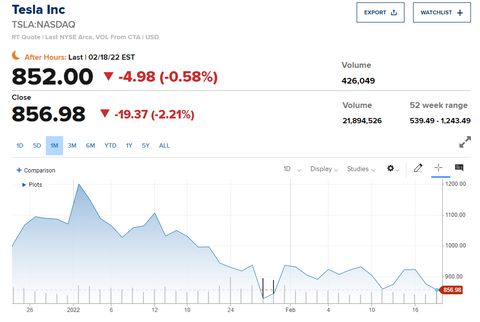Tesla under investigation for "ghost brakes"! 416,000 vehicles involved, company's stock price plunges over 5%
On February 17, the National Highway Traffic Safety Administration (NHTSA) announced that it would launch a formal investigation into 416,000 Tesla vehicles because the agency had received complaints that Tesla's Autopilot system had unexpectedly activated its brakes.
It is reported that this phenomenon is commonly referred to as "Phantom Braking" (Phantom Braking), that is, when the user turns on the Tesla vehicle's Autopilot system, the vehicle will suddenly brake without warning in a situation that does not require braking. Currently, NHTSA has received 354 complaints about Tesla's "phantom braking".
At the end of the day, Tesla shares closed at $876.35 per share, down 5.09%, with a market capitalization of $905.7 billion.

NHTSA Increases Investigation of Tesla
According to NHTSA, the agency received 354 complaints related to "ghost braking" in the past nine months, involving Model 3 and Model Y models sold in the U.S. market in 2021-2022, which will initially affect 416,000 Tesla vehicles.
All Tesla vehicles under review are reportedly equipped with Autopilot, the company's self-driving assistance system.
The agency said the complainant reported that he was using the Tesla vehicle's advanced driver assistance features, including adaptive cruise control, when the vehicle would unexpectedly brake at high speeds. This rapid deceleration occurred randomly without any warning and often repeatedly during the same driving cycle.
NHTSA revealed that the agency will determine the scope and severity of the potential problem and fully evaluate potential safety-related issues.
In fact, this is not the first time NHTSA has launched an investigation into Tesla. Last August, NHTSA announced that the agency had begun a formal investigation into Tesla's Autopilot automated assisted driving system due to multiple collisions between Tesla cars and parked vehicles, which will involve 765,000 vehicles, including Model Y, X, S and 3 models.
Last December, a media report said that NHTSA's investigation into Tesla's Autopilot system was still in the evaluation phase, and NHTSA planned to complete its evaluation within 120 days and then decide whether to escalate to an engineering analysis or end the investigation.
Some industry analysts say that the "ghost braking" fault that put Tesla under NHTSA investigation was mainly due to the elimination of millimeter wave radar from the vehicle.
In October last year, Tesla said its ghost brake failure was triggered by an FSD software update. As a result, Tesla recalled the updated version of the FSD software at that time. But after the recall, the complaints against the "ghost brakes" have increased rather than decreased.
It is reported that Tesla's "ghost brakes" complaints spiked just after it announced that it would stop using millimeter wave radar as a sensor for its autopilot system, so some industry insiders judge that the frequency of Tesla's "ghost brakes" failures is related to its insistence on building a purely visual autopilot sensing system.
According to incomplete statistics, in the past six months, Tesla has recalled a total of about 15 times, including 11 times in the United States, three times in China and once in Canada, involving its four mass-production models. Its four most recent recalls were due to noise from the Boombox function, failure of the defrost and defogging system, failure of the seatbelt beep, and the risk of crashing from the automatic parking function.
In response, Tesla CEO Elon Musk tweeted last week, "The funny cops made us do it." It is suspected to express that the latest recall was under pressure from regulators.
Receiving an SEC subpoena
Tesla is facing multiple regulatory pressures
In addition to the NHTSA investigation, Tesla is reportedly facing scrutiny from other regulators.
On February 7 of this year, Tesla filed its annual report K10 with the U.S. Securities and Exchange Commission (SEC). The filing showed that an impairment loss of approximately $101 million was recorded due to changes in the carrying value of the company's bitcoin. Also, the filing shows that the company was brought to the attention of the SEC because of Musk. on Nov. 16, 2021, the SEC issued a subpoena to the company requesting information on the company's compliance with the settlement agreement regarding Musk's tweets and information on related management processes.
It is understood that in 2018, Musk had stated on social media that he was attempting to take the company private and was subsequently charged with securities fraud by the SEC. in September 2018, the parties reached an agreement that Tesla would need to regulate Musk's public statements. in 2019, Musk again made statements about Tesla's production and triggered stock price volatility, and the SEC again investigated him. The parties tweaked this settlement in April of that year to clarify the topic of Musk's inability to make public statements without permission from the company's lawyers.
Since then, however, Musk has not completely settled with the SEC, and has repeatedly tweeted tweets suggesting that he is under regulatory pressure.






























